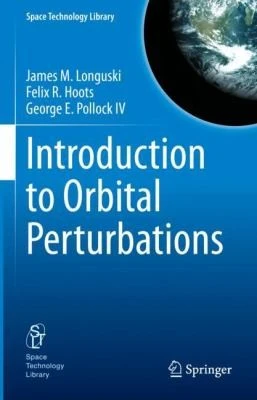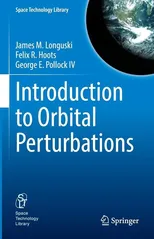Introduction to Orbital Perturbations
40
(Author) James M. LonguskiThis textbook provides details of the derivation of Lagrange's planetary equations and of the closely related Gauss's variational equations, thereby covering a sorely needed topic in existing literature. Analytical solutions can help verify the results of numerical work, giving one confidence that his or her analysis is correct. The authors—all experienced experts in astrodynamics and space missions—take on the massive derivation problem step by step in order to help readers identify and understand possible analytical solutions in their own endeavors. The stages are elementary yet rigorous; suggested student research project topics are provided. After deriving the variational equations, the authors apply them to many interesting problems, including the Earth-Moon system, the effect of an oblate planet, the perturbation of Mercury's orbit due to General Relativity, and the perturbation due to atmospheric drag. Along the way, they introduce several useful techniques such as averaging, Poincaré's method of small parameters, and variation of parameters. In the end, this textbook will help students, practicing engineers, and professionals across the fields of astrodynamics, astronomy, dynamics, physics, planetary science, spacecraft missions, and others. “An extensive, detailed, yet still easy-to-follow presentation of the field of orbital perturbations.” - Prof. Hanspeter Schaub, Smead Aerospace Engineering Sciences Department, University of Colorado, Boulder “This book, based on decades of teaching experience, is an invaluable resource for aerospace engineering students and practitioners alike who need an in-depth understanding of the equations they use.” - Dr. Jean Albert Kéchichian, The Aerospace Corporation, Retired “Today we look at perturbations through the lens of the modern computer. But knowing the why and the how is equally important. In this well organized and thorough compendium of equations and derivations, the authors bring some of the relevant gems from the past back into the contemporary literature.” - Dr. David A Vallado, Senior Research Astrodynamicist, COMSPOC “The book presentation is with the thoroughness that one always sees with these authors. Their theoretical development is followed with a set of Earth orbiting and Solar System examples demonstrating the application of Lagrange’s planetary equations for systems with both conservative and nonconservative forces, some of which are not seen in orbital mechanics books.” - Prof. Kyle T. Alfriend, University Distinguished Professor, Texas A&M University
James M. Longuski
James M. Longuski is a renowned aerospace engineer and author, known for his work on space mission design and orbital mechanics. His book "A Modern Introduction to Astronautics" is a seminal work in the field. Longuski's writing is clear, concise, and engaging, making complex concepts accessible to all readers.



